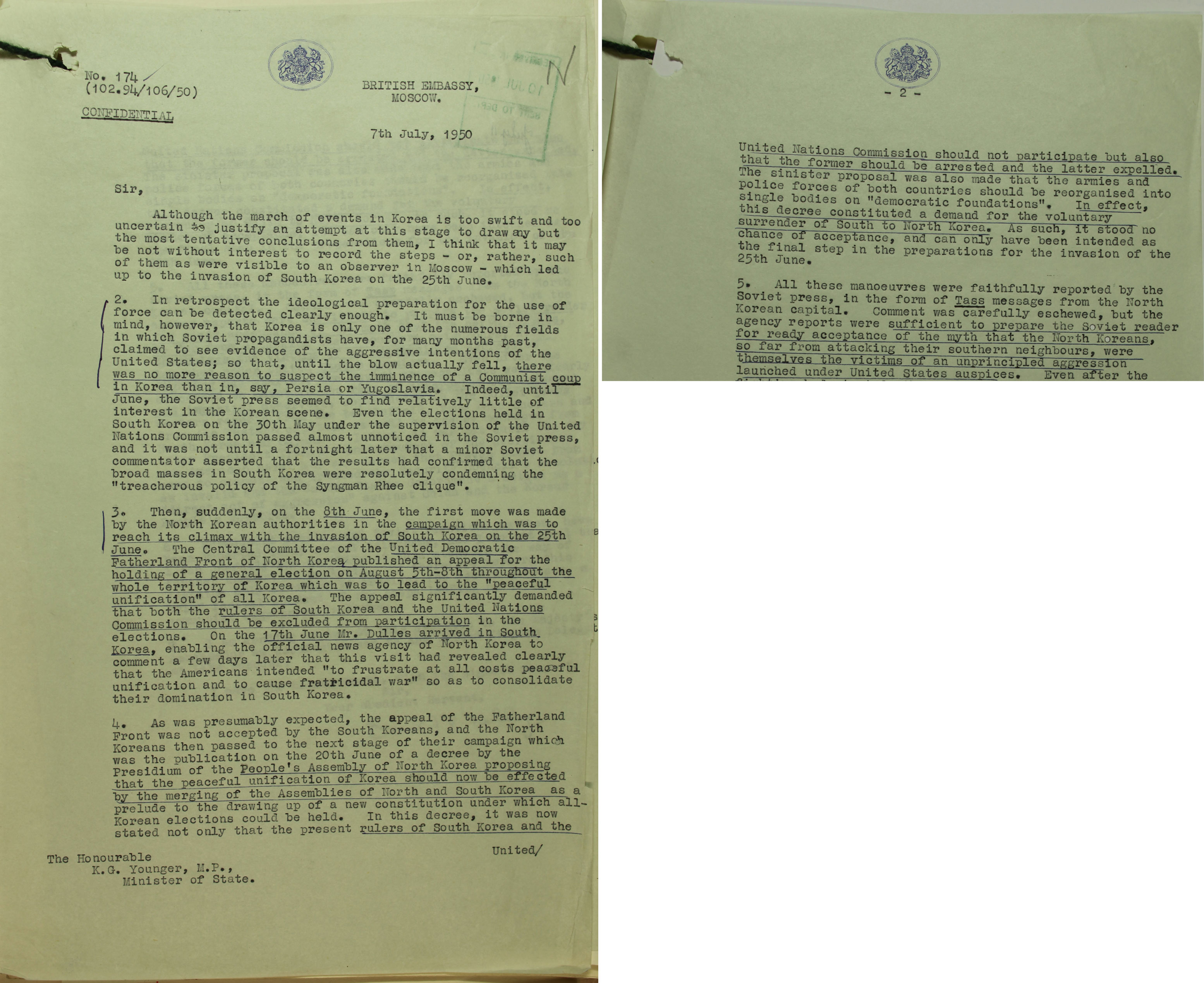
Extract from a Foreign Office report on the Soviet government’s management of media coverage of the Korean War July 7th 1950. (Catalogue ref: FO 371/86738)
Transcript
British embassy, Moscow
7th July 1950
Sir
Although the march of events in Korea is too swift and too uncertain to justify an attempt at this stage to draw any but the most tentative conclusions from them, I think that it may be not without interest to record the steps – or, rather, such of them as were visible to an observer in Moscow – which led up to the invasion of South Korea on the 25th June.
2. In retrospect the ideological preparation for the use of force can be detected clearly enough. It must be borne in mind, however, that Korea is only one of the numerous fields in which Soviet propagandists have, for many months past, claimed to see evidence of the aggressive attentions of the United States; so that until the blow actually fell, there was no more reason to suspect the imminence of a Communist coup in Korea than in, say, Persia or Yugoslavia. Indeed until June, the Soviet press seemed to find relatively little interest in the Korean scene. Even the elections held in South Korea on the 30th May under the supervision of the United Nations Commission passed almost unnoticed in the Soviet Press, and it was not until a fortnight later that a minor Soviet commentator asserted that the results had confirmed that the broad masses in South Korea were resolutely condemning the “treacherous policy of the Syngman Rhee clique”.
3. Then, suddenly, on the 8th June, the first move was made by the North Korean authorities in the campaign which was to reach its climax with the invasion of South Korea on the 25th June. The Central Committee of the United Democratic Fatherland Front of North Korea published an appeal for the holding of a general election on August 5th-8th August throughout the whole territory of Korea which was to lead to the “peaceful unification” of all Korea. The appeal significantly demanded that both the rulers of South Korea and the United Nations Commission should be excluded from participation in the elections. On the 17th June Mr. Dulles arrived in South Korea, enabling the official news agency of North Korea to comment a few days later that this visit had revealed clearly that the Americans intended to “frustrate at all costs peaceful unification and to cause fratricidal war” so as to consolidate their dominion in South Korea.
4. As was presumably expected, the appeal of the Fatherland Front was not accepted by the South Koreans, and the North Koreans then passed to the next stage of their campaign which was the publication on the 20th June of a decree by the Presidium of the People’s Assembly of North Korea proposing that the peaceful unification of Korea should now be effected by the merging of the Assemblies of North and South Korea as prelude to the drawing up of a new constitution under which all Korean elections could be held. In this decree, it was now stated not only that the present rulers of South Korea and the United Nations Commission should not participate but also that the former should be arrested and the later expelled. The sinister proposal was also made that the armies and police forces of both countries should be reorganised into single bodies on “democratic foundations”. In effect the decree constituted a demand for the voluntary surrender of South to North Korea. As such, it stood no chance of acceptance, and can only have been intended as the final step in the preparations for the invasion of the 25th June.
5. All these manoeuvres [by the North Koreans] were faithfully reported by the Soviet press, in the form of Tass messages from the North Korean capital. Comment was carefully eschewed, but the agency reports were sufficient to prepare the Soviet reader for ready acceptance of the myth that the North Koreans, so far from attacking their Southern neighbours, were themselves the victims of an unprincipled aggression launched under United States auspices.
…
